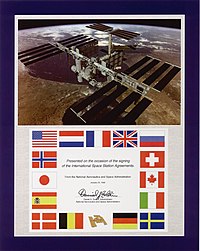International Space Station program

A Commemorative Plaque honoring Space Station Intergovernmental Agreement signed on January 28, 1998.
|
|
| International Space Station Program Managers | |
|---|---|
| Canadian Space Agency | Pierre Jean |
| European Space Agency | Bernardo Patti |
| Japan Aerospace Exploration Agency | Yoshiyuki Hasegawa |
| Roscosmos | Alexey Krasnov |
| NASA | Michael Suffredini |
The International Space Station program is tied together by a complex set of legal, political and financial agreements between the fifteen nations involved in the project, governing ownership of the various components, rights to crewing and utilization, and responsibilities for crew rotation and station resupply. These agreements tie together the five space agencies and their respective International Space Station Programs and govern how they interact with each other on a daily basis to maintain station operations, from traffic control of spacecraft to and from the station, to utilization of space and crew time. In spring 2010, the International Space Station Program Managers from each of the five partner agencies were presented with Aviation Week's Laureate Award in the Space category, and NASA's International Space Station Program was awarded the 2009 Collier Trophy.
The legal structure that regulates the station is multi-layered. The primary layer establishing obligations and rights between the ISS partners is the Space Station Intergovernmental Agreement (IGA), an international treaty signed on January 28, 1998 by fifteen governments involved in the Space Station project. The ISS consists of Canada, Japan, the Russian Federation, the United States, and eleven Member States of the European Space Agency (Belgium, Denmark, France, Germany, Italy, The Netherlands, Norway, Spain, Sweden, Switzerland and the United Kingdom). Article 1 outlines its purpose:
This Agreement is a long term international co-operative framework on the basis of genuine partnership, for the detailed design, development, operation, and utilization of a permanently inhabited civil Space Station for peaceful purposes, in accordance with international law.
The IGA sets the stage for a second layer of agreements between the partners referred to as 'Memoranda of Understanding' (MOUs), of which four exist between NASA and each of the four other partners. There are no MOUs between ESA, Roskosmos, CSA and JAXA because NASA is the designated manager of the ISS. The MOUs are used to describe the roles and responsibilities of the partners in more detail.
A third layer consists of bartered contractual agreements or the trading of the partners' rights and duties, including the 2005 commercial framework agreement between NASA and Roskosmos that sets forth the terms and conditions under which NASA purchases seats on Soyuz crew transporters and cargo capacity on unmanned Progress transporters.
...
Wikipedia
